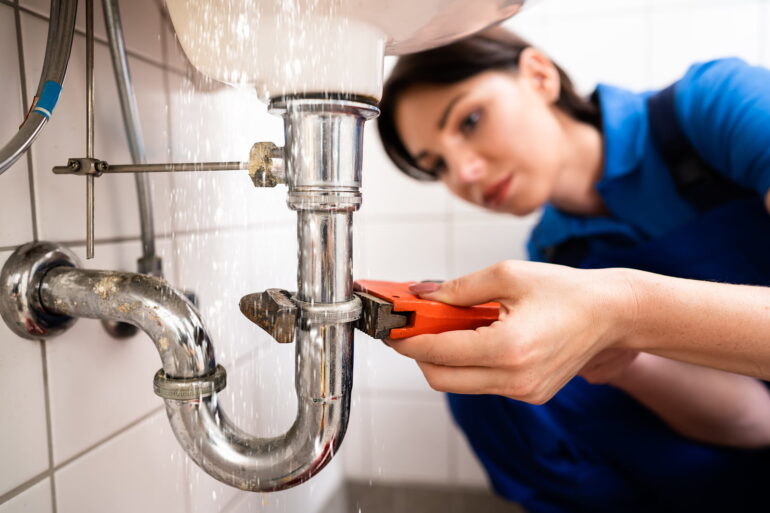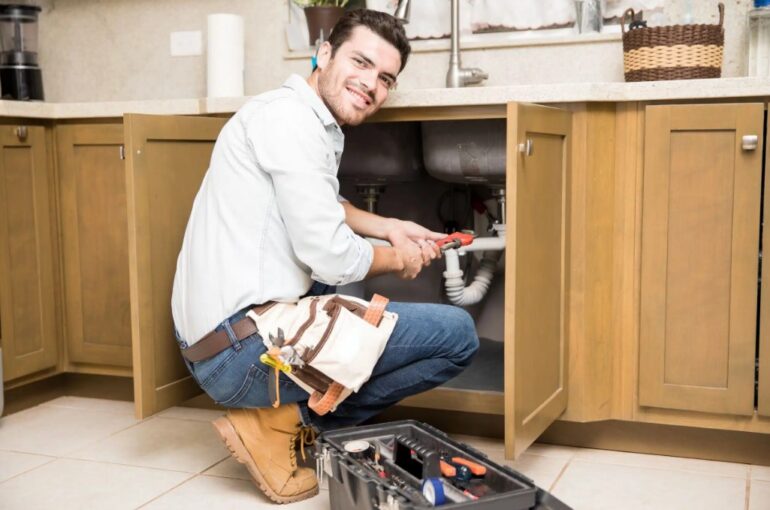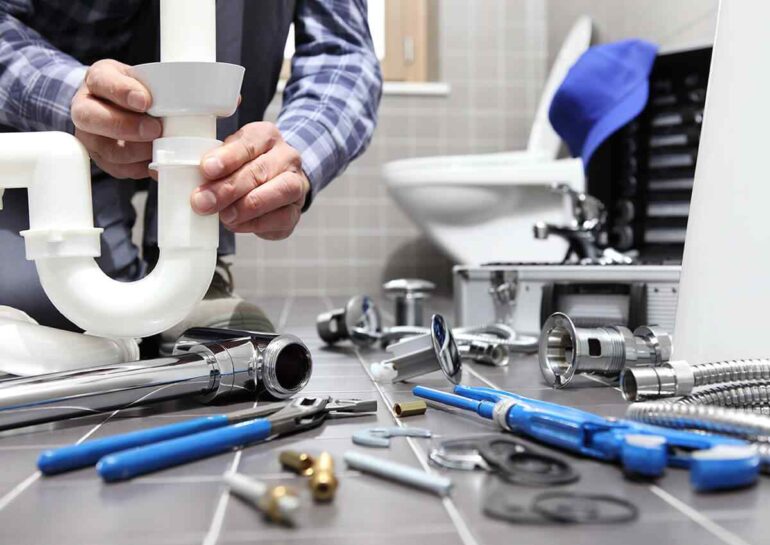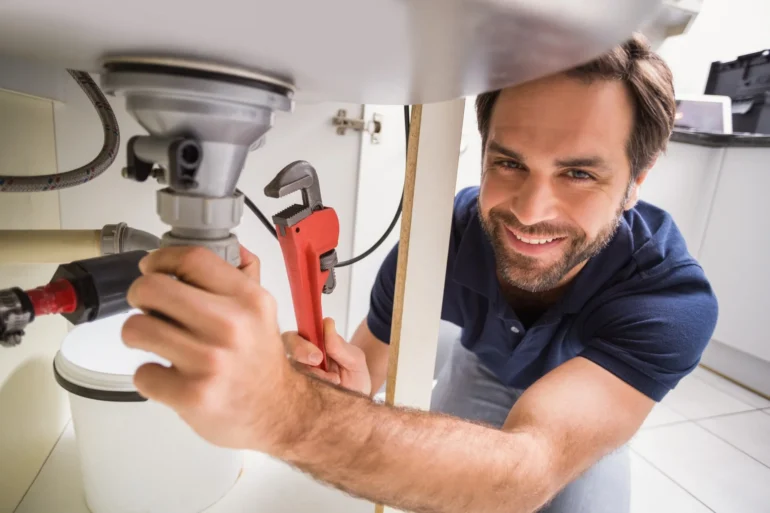
Plumbing systems, the quiet workhorses of our homes and businesses, often go unnoticed until a disaster strikes. Suddenly, we find ourselves grappling with leaks, blockages, or even worse, substantive water damage.
Given the pivotal role these systems play in our everyday activities – from taking our morning shower to washing dishes in the kitchen sink – any disruption can send our routine into disarray. That’s why having an in-depth understanding of common plumbing problems and applying efficient strategies to tackle them is crucial.
This comprehensive guide aims to empower homeowners and businesses with the knowledge and practical techniques to handle plumbing emergencies. These strategies, backed by years of plumbing experience, are designed to provide immediate solutions, mitigate potential damage, and restore normalcy as quickly as possible.
In this regard, adopting a proactive stance towards plumbing issues can save significant time, resources, and stress.
Therefore, consider this useful guide for your partner in combating the challenges plumbing crises can present. It will provide clear, step-by-step instructions, suitable for both first-time homeowners and seasoned business personnel, to manage any disruptions in their plumbing systems.
Understanding Common Plumbing Issues
Imagine waking up to a cold shower on a chilly morning because your water heater has malfunctioned or discovering a blocked toilet when you are expecting guests. Plumbing problems can range from minor irritants to major crises, wreaking havoc on your daily life and potentially causing extensive damage to your property.
Common plumbing issues are often related to leaks, blockages, inefficiencies in water heating, and issues in the sewer system. These problems might present themselves in different ways, depending on their severity. Readily identifiable signs that suggest these issues include low water pressure, damp spots on walls or floors, unexpected foul smells, slow-draining sinks or toilets, and inconsistent water temperature.
Ignoring these early warning signs may allow these plumbing issues to escalate over time. Unaddressed leaks can lead to water damage, causing structural issues, and exposing your home to mould growth, which can have serious health impacts. Moreover, ongoing plumbing issues can significantly increase your water and energy bills, thus creating a financial drain over time.

Essential Plumbing Tools Every Home and Business Need
Going to battle without your armour is unwise – the same applies when dealing with plumbing crises. Having a ready supply of essential plumbing tools can often mean the difference between a prompt resolution and a lingering problem.
This toolbox needs to contain a selection of practical items, each serving a distinct purpose. Pipe cutters, for instance, may be required to remove damaged pipe sections, while plungers and plumber’s snakes can come in handy for clearing stubborn blockages. Adjustable wrenches and basin wrenches are crucial for tightening or loosening pipe connections, while seal tape is invaluable in temporarily fixing minor leaks.
Maintaining these tools in good condition can extend their lifespan and improve their efficiency. When you need them, they will be ready to perform their task without causing any additional problems.
Further, ensure these tools are easily accessible – perhaps in a labelled container in your utility room. This will save valuable time during an emergency, allowing you to act swiftly and prevent potential damage from worsening.
Do-It-Yourself (DIY) Strategies for Dealing with Plumbing Crises
Some plumbing issues are less complex and can be successfully managed through DIY strategies, saving you both time and the expense of calling in a professional. For example, situations like a leaky faucet or a slow-draining sink don’t always require professional expertise. You can usually seal minor leaks effectively by using seal tape or tightening loose connections with a wrench, thereby resolving the problem.
However, it’s important to remember that DIY strategies are not a panacea for all plumbing problems. Their applicability often relates to the nature and scale of the issue at hand, and even then, success largely depends on your comfort and familiarity with basic plumbing tasks.
Given this caveat, DIY solutions can be quite effective if utilised appropriately. From cost savings to prompt issue resolution, taking matters into your own hands has its benefits. However, it’s equally important to recognise instances where your DIY efforts may be inadequate or potentially exacerbate the problem. At such times, calling in a professional is not only necessary but could save you from causing further damage.

When to Call in a Professional Plumber
Some plumbing crises demand skills and expertise that go beyond DIY solutions. Complex issues like chronic leaks coming from unclear sources, recurring or extensive blockages, unexplainably low water pressure, and incapacitated water heaters are cases where professional help is necessary.
Hiring a trained plumber in such situations comes with multiple benefits. The most obvious one is that their extensive knowledge and skills set them apart from the average homeowner when it comes to diagnosing and fixing complicated plumbing problems. But it’s not just about fixing the problem at hand; professional plumbers can also provide tailored advice to prevent similar issues in the future. Plus, they have ready access to industry-grade tools and equipment, further ensuring precise and lasting solutions.
Choosing a professional plumber should never be done on a whim but should follow an informed decision-making process. It’s advisable to check their certifications, get a sense of their reputation through customer reviews, and inquire about their response times. Emergency plumbers are always on call, ready to assist you when unexpected plumbing disasters strike.
The Importance of Routine Plumbing Maintenance
As with most things in life, prevention is often better than cure, and this principle applies well to maintaining your plumbing systems. Probable practical experiences have shown that routine, preventive maintenance can significantly reduce the likelihood and severity of plumbing crises.
Routine maintenance involves planned, regular check-ups and remedial actions that aim to identify potential problems and nip them in the bud before they escalate into larger issues. This could involve tasks like checking pipes for signs of corrosion, cleaning drains to prevent sediment buildup that could lead to blockages, and routinely inspecting and adjusting water heaters for optimum performance.
Implementing a successful plumbing maintenance schedule involves both DIY strategies for minor routine tasks and calling in professionals for more thorough, periodic inspections. A balanced approach to plumbing maintenance can extend the life of your plumbing system, ensure its efficient operation, and ultimately, save you from dealing with frequent, disruptive plumbing emergencies.

Conclusion
In conclusion, dealing with plumbing emergencies effectively involves a combination of understanding common plumbing issues, having the right set of tools on hand, successfully applying DIY strategies when appropriate, knowing when to call in the professionals, and, most importantly, actively engaging in regular plumbing maintenance.
This comprehensive guide has aimed to provide you with an extensive framework to help you prepare for and effectively deal with potential plumbing crises. We hope these strategies, tools, and tips empower you to address plumbing emergencies with confidence and efficiency. After all, a prepared home or business owner can prevent a hiccup from becoming a crisis. Bookmark this guide and share it with friends and family, as it could prove invaluable in future plumbing situations.
Still faced with questions or uncertainties regarding your next plumbing misadventure? Don’t hesitate to reach out to professional plumbers who can provide expert advice. Remember, when it comes to plumbing issues, a proactive and informed approach is your best ally. Regular maintenance combined with timely, effective actions can save you a world of trouble and keep disruptions to a minimum.
